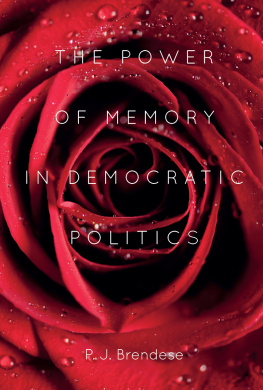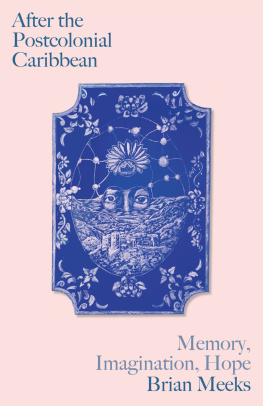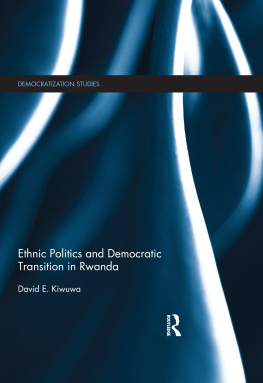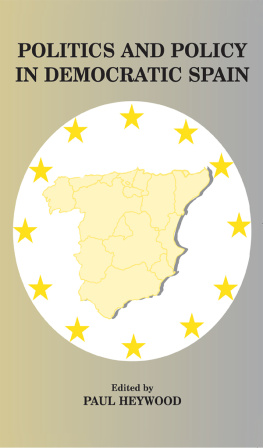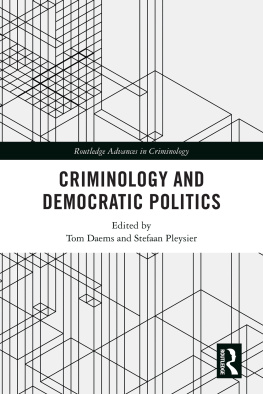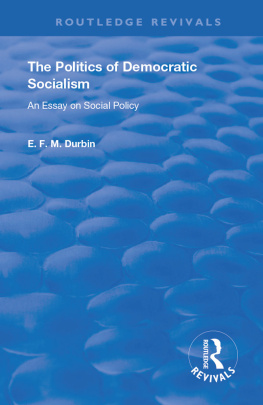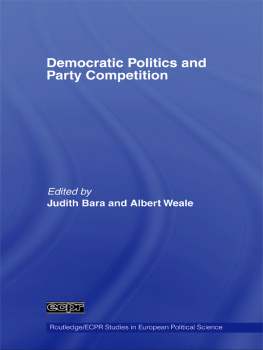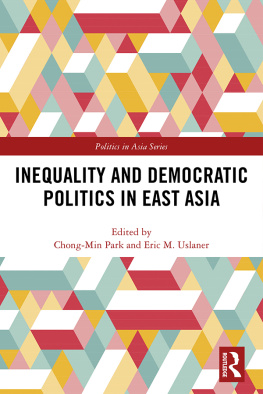T HE P OWER OF M EMORY IN
D EMOCRATIC P OLITICS
George Orwell famously argued that those who control the past control the future, and those who control the present control the past. In this study of the relationship between democracy and memory, P. J. Brendese examines Orwells insight, revealing how political power affects what is available to be remembered, who is allowed to recall the past, and when and where past events can be commemorated. Engaging a diverse panoply of thinkers that includes Sophocles, Friedrich Nietzsche, Jacques Derrida, James Baldwin, and Toni Morrison, Brendese considers the role of disavowed memory and the politics of collective memory in democratic processes throughout history. Among the cases treated are democracy in ancient Athens, South Africas effort to transition from apartheid via its landmark Truth and Reconciliation Commission, Mexicos struggle to fortify democratic accountability after the dirty war, and the unresolved legacy of slavery in US race relations. The Power of Memory in Democratic Politics draws on these national histories to develop a theory of memory that accounts for the ways the past lives on in unconscious, habituated practices, shaping the possibilities of freedom, action, and political imagination.
P. J. Brendese is assistant professor of political science at Johns Hopkins University.
Rather than simply argue that forgetting the past dooms us to repeat it, Brendese presents us with an inspired theory of spectral materialism that goes further, by alerting us to the tragic ways that we abandon our democratic ideals when we willfully forget, even if we do this in the name of democracy itself. CONTEMPORARY POLITICAL THEORY
P.J. Brendeses book brilliantly weaves together theoretical issues with developed empirical cases, and with a very good sense for what is politically important. The chapters on the TRC, on race and memory in America, and on Mexico are all exceptionally illuminating. A remarkable achievement. - W. James Booth, Vanderbilt University.
P.J. Brendese has written an exceptional book on one of the central political questions of our time: the relationship between memory and democracy. The volume brilliantly examines how the past is often denied, reclaimed, and transformed in the political process, deeply influencing political identity. Brendeses analysis is nuanced and learned, illuminating the problems in coming to terms with the buried past. An indispensable book for contemporary political theorists. - Cynthia Halpern, Swarthmore College.

Madeleine . . .
Madeleine . . .
Madeleine . . .
C ONTENTS
P REFACE
Many historical controversies boil down to who has the power to name what.... The naming of the fact is itself a narrative of power disguised as innocence.
Michel-Rolph Trouillot
Its memories that Im stealing, but youre innocent when you dream.
Tom Waits
It is the innocence which constitutes the crime.
James Baldwin
This book grew out of questions about the nature of memoryhow the past lives on in the present, and the extent to which our personal and collective memories shape our futures. Many years ago I began thinking about how our relationship to the past affects our sense of what is possible, and how memory affects our ability to achieve those possibilities. As I learned more about the tortured history of North America and nations attempting to transition to democracy, these concerns began to take a more explicitly political shape. In this volume, I ask which relationships to memory enable, or threaten, democratic possibilities.
My purpose in this preface is to offer the reader a clear sense of why I take these themes to be so deserving of closer consideration. The questions about memory that animate this book are political and theoretical. They are also personalthough my own memories are not the explicit theme of the chapters that follow. That said, I begin with an unconventional preface that includes a description of my own encounters with memory in an American context. These recollections serve as windows looking out onto broader reflections on memory in contemporary politics. While I do not necessarily think all individual experiences have a political analog, I hope to make clearer the political resonance of the topic and the particular sensibility with which I approach it in the coming pages.
Although academic writing is often pitched in the voice of an omniscient god speaking from on high, this project emerged from my eye-level encounters with what philosophers often refer to as the death of God. Some of my earliest memories are of growing up above my familys funeral home in upstate New York and helping my parents with the business. For me, daily interactions with grief and death were the norm. That this was not everyones idea of normal rarely escaped my notice. Dead people scared even a great many of the adults I met. And while my classmates found it strange that we had a morgue in our basement, I found it strange that they did not have one in theirs. From early on I learned to smile politely when repeatedly hearing that people were dying to get into our house. When I became a teenager, I would assure them that some people were dying to get out too. And while working in the shadow of my parents sincerity and civic-mindedness, I developed a profound appreciation for the layers of truth in the joke that my folks were indeed the last to let you down.
The holidays were an especially busy time for us. There were winters when it seemed like my time spent on the grounds of frozen cemeteries was exceeded only by that of those buried in them. Perhaps this was because, for those grieving, holiday traditions made the absence of the dead ever more present, thereby hastening widows and widowers to follow their beloved to the grave. Each day I was introduced to people whose grief made it difficult for them to affirm life amidst losses they could neither forget nor escape. We would meet with the bereaved at all hours, care for them and their deceased loved ones, and then coordinate the wake, funeral, and burial services. These encounters were generally unlike everyday social exchanges scripted by status, and cloaked in euphemism and artifice. Frequently, they were much more immediate, honest, and human.
At each stage of the process, my family forged relationships with shattered adults who were remarkably dignified, but hardly self-possessed and self-sovereign in a sense resonant with modern political theory or American political thought. Over time, the disjuncture between the theoretical portrayals of memory as being able to be set aside or triumphed over, and my own experience of those for whom the past is ever-present, occasioned this study. Suffice it to say that I hardly needed academic texts to learn that memory is a crucial part of what we consider a fully human life.
I witnessed what some consider the living death of a life without memory when my father and I went to nursing homes and heard amnesiac residents crying out for us to help them escape. I wondered if, without the memory that makes up my identity, perhaps I too might be tempted to seek the kind of escape funeral directors provide. Alzheimers and dementia are clearly conditions of too little memory. Depression, anxiety, grief, and resentment, on the other hand, might be conditions of too much memory. Even among the youthful, these afflictions can lead to self-destruction. I will never forget the sunny spring day when my father and I wheeled a stretcher across a grassy playground to find the body of a young man. Overcome by despair, he had committed suicide by hanging himself. These experiences conditioned my view of memory as part of the tragedy of the human condition. That is, memory is both a blessing and a curse. As Neil Young put it, The same thing that makes you live can kill you in the end.


